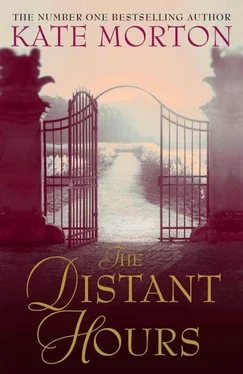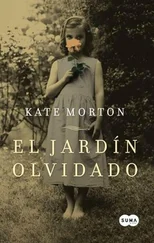The book had been old when it came to me, and passionately well loved since, so its state of déshabillé was to be expected. Within its crumbling binding were stuck the very pages I’d turned when the world they described was new: when I didn’t know how things might end for Jane and her brother and the poor, sad man in the mud.
I’d been longing to read it again, ever since I returned from my visit to Milderhurst, and with a swift intake of breath, I opened the book randomly, letting my eyes alight in the middle of a lovely, foxed page: The carriage that took them to live with the uncle they’d never met set off from London in the evening and travelled through the night, arriving at last at the foot of a neglected drive while dawn was breaking. I read on, bumping in the back of that carriage beside Jane and Peter. Through the weary, whiney gates we went, up the long and winding path, until finally, at the top of the hill, cold in the melancholy morning light, it appeared. Bealehurst Castle. I shivered with anticipation at what I might find inside. The tower broke through the roofline, windows dark against the creamy stone, and I leaned out with Jane, laid my hand beside hers on the carriage window. Heavy clouds fleeted across the pale sky, and when the carriage finally stopped with a clunk we clambered out to find ourselves standing by the rim of an ink-black moat. A breeze then, from nowhere, rippling the water’s surface, and the driver gestured towards a wooden drawbridge. Slowly, silently, we walked across it. Just as we reached the heavy door, a bell rang, a real one, and I almost dropped the book.
I don’t think I’ve mentioned the bell yet. While I was returning boxes to the attic, Dad had been set up to convalesce in the spare room, a pile of Accountancy Today journals on the bedside table, a cassette player loaded with Henry Mancini, and a little butler’s bell for summoning attention. The bell had been his idea, a distant memory from a bout of fever as a boy and, after a fortnight during which he’d done little more than sleep, Mum had been so pleased to see a return of spirit that she’d happily gone along with the suggestion. It made good sense, she’d said, failing to anticipate for a moment that the small, decorative bell might be commandeered for such nefarious use. In Dad’s bored and grumpy hands, it became a fearful weapon, a talisman in his reversion to boyhood. Bell in fist, my mild-mannered, number-crunching father became a spoiled and imperious child, full of impatient questions as to whether the postman had been, what Mum was doing with her day, what time he might expect his next cup of tea to be served.
On the morning that I found the box with the Mud Man inside, however, Mum was at the supermarket and I was officially on Dad-watch. At the sound of the bell, the world of Bealehurst withered, the clouds receded quickly in all directions, the moat, the castle vanished, the step on which I stood turned to dust so that I was falling, with nothing but black text floating in the white space around me, dropping through the hole in the middle of the page to land with a bump back in Barnes.
Shameful of me, I know, but I sat very still for a few moments, waiting it out in case I earned a reprieve. Only when the bell’s tinkle came a second time did I tuck the book inside my cardigan pocket and clamber, with regrettable reluctance, down the ladder.
‘Hiya, Dad,’ I said, brightly – it is not kind to resent intrusions from a convalescent parent – arriving at the spare-room door. ‘Everything all right?’
He’d slumped so far he’d almost disappeared inside his pillows. ‘Is it lunchtime yet, Edie?’
‘Not yet.’ I straightened him up a bit. ‘Mum said she’d fix you some soup as soon as she got in. She’s made a lovely pot of-’
‘Your mother’s still not back?’
‘Shouldn’t be long.’ I smiled sympathetically. Poor Dad had been through an awful time: it isn’t easy for anyone being bed-bound weeks on end, but for someone like him, with no hobbies and no talent whatsoever for relaxing, it was torture. I freshened his water glass, trying not to finger the top of the book protruding from my pocket. ‘Is there anything I can fetch you in the meantime? A crossword? A heat pad? Some more cake?’
He let out a forebearing sigh. ‘No.’
‘Are you sure?’
‘Yes.’
My hand was on the Mud Man again, my mind had taken guilty leave to debate the particular merits of the daybed in the kitchen and the armchair in the lounge, the one by the window that spends the afternoon drenched in sunlight. ‘Well then,’ I said sheepishly, ‘I guess I’ll get back to it. Chin up, eh, Dad…’
I was almost at the door when, ‘What’s that you’ve got there, Edie?’
‘Where?’
‘There, sticking out of your pocket.’ He sounded so hopeful. ‘Not the post, is it?’
‘This? No.’ I patted my cardigan. ‘It’s a book from one of the attic boxes.’
He pursed his lips. ‘The whole point is to stow things away, not to dig them out again.’
‘I know, but it’s a favourite.’
‘What’s it all about then?’
I was stunned; I couldn’t think that my dad had ever asked me about a book before. ‘A pair of orphans,’ I managed. ‘A girl called Jane and a boy called Peter.’
He frowned impatiently. ‘A little more than that, I should say. By the looks of it, there’s a lot of pages.’
‘Of course – yes. It’s about far more than that.’ Oh, where to start! Duty and betrayal, absence and longing, the lengths to which people will go to protect the ones they cherish, madness, fidelity, honour, love… I glanced again at Dad and decided to stick with the plot. ‘The children’s parents are chargrilled in a ghastly London house fire and they’re sent to live with their long-lost uncle in his castle.’
‘His castle?’
I nodded. ‘Bealehurst. Their uncle’s a nice enough fellow, and the children are delighted by the castle at first, but gradually they come to realize that there’s more going on than meets the eye; that there’s a deep, dark secret lurking beneath it all.’
‘Deep and dark, eh?’ He smiled a little.
‘Oh yes. Both. Very terrible indeed.’
I’d said it quickly, excitedly, and Dad leaned closer, easing himself onto his elbow. ‘What is it then?’
‘What’s what?’
‘The secret. What is it?’
I looked at him, dumbfounded. ‘Well, I can’t just… tell you.’
‘Of course you can.’
He crossed his arms like a cranky child and I scrabbled for the words to explain to him the contract between reader and writer, the dangers of narrative greed. The sacrilege of just blurting out what had taken chapters to build; secrets hidden carefully by the author behind countless sleights of hand. All I managed was, ‘I’ll lend it to you if you like?’
He pouted unbecomingly. ‘Reading makes my head ache.’
A silence settled between us, tending towards uncomfortable as he waited for me to concede and I – of course, for what choice did I have? – refused. Finally, he gave a forlorn sort of sigh. ‘Never mind,’ he said, waving his fingers disconsolately. ‘I suppose it doesn’t matter.’
But he looked so glum, and the memory came upon me so intensely of how I’d fallen into the world of the Mud Man when I was laid up with mumps or whatever it was, that I couldn’t help saying, ‘If you really want to know, I suppose I could read it to you.’
The Mud Man became our habit; something I looked forward to every day. As soon as dinner was over, I helped Mum with the kitchen, cleared Dad’s tray, then he and I would pick up wherever we’d left off. He couldn’t fathom that a made-up story could interest him so avidly. ‘But it must be based on true events,’ he said repeatedly, ‘an old kidnapping case. Like that Lindbergh fellow, the child taken from his bedroom window?’
Читать дальше












